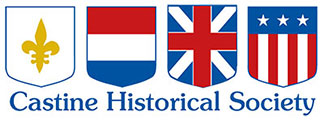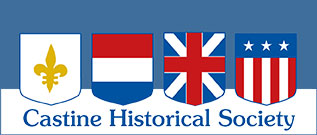Liam Riordan lectures at MMA Delano Hall. Photo by Aaron Paley.
Speaker Videos
Each year, the Castine Historical Society brings in speakers for its Annual Meeting, as well as for special events or subjects. These lectures are recorded and made available to everyone.
2024
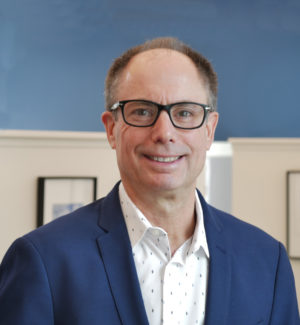 The 15th Annual Deborah Pulliam Memorial Lecture: “Rising from the Ashes: Building on Restituted Family Property in Post-Nazi Berlin, Germany”
The 15th Annual Deborah Pulliam Memorial Lecture: “Rising from the Ashes: Building on Restituted Family Property in Post-Nazi Berlin, Germany”
An illustrated talk by Hans D. Strauch, a Boston based architect and Castine summer resident, in which he discusses how the Mosse family legacy was all but erased by the time Strauch, a Mosse descendent and founder of Boston’s HDS Architecture, first visited Berlin, Germany.
View this talk on the CHS YouTube channel by clicking HERE.
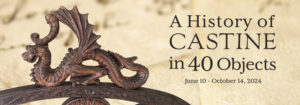 “A History of Castine in 40 Objects”
“A History of Castine in 40 Objects”
Castine Historical Society’s Executive Director, Lisa Simpson Lutts, gives an illustrated talk highlighting objects from CHS’s permanent collection that tell unexpected and compelling stories about the town’s 400-year history. Lutts uncovers some exciting discoveries made by the staff and exhibit committee while conducting research for the season’s exhibit. Hear fascinating stories about Jesuit priests, World War II soldiers, ship captains sailing to China, and tales of Castine’s woman-run movie theater.
View this talk on the CHS YouTube channel by clicking HERE.
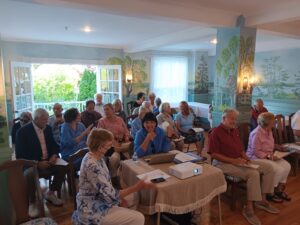 Annual Meeting 2024
Annual Meeting 2024
The Annual Meeting included a brief business meeting . Video can be viewed HERE.
2023
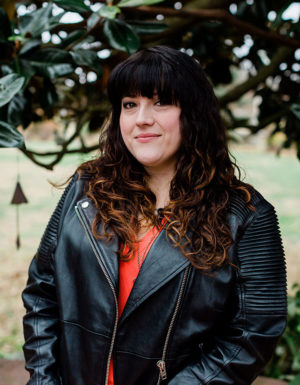 The 14th Annual Deborah Pulliam Memorial Lecture, “Cargos of Despair: Northern New England and the Slave Trade”
The 14th Annual Deborah Pulliam Memorial Lecture, “Cargos of Despair: Northern New England and the Slave Trade”
In her talk, Dr. Kate McMahon of the Smithsonian Institution discusses how the United States prohibited its citizens from participating in the African slave trade in 1808. Yet despite this, northern New Englanders, including Mainers, plied the coasts of Africa in increasing numbers from 1808 until 1862, transporting and selling hundreds of thousands of captive Africans to the Caribbean and South America. This talk discusses how this brutal traffic occurred, and the ways in which African people resisted their enslavement.
View this talk on the CHS YouTube channel by clicking HERE.
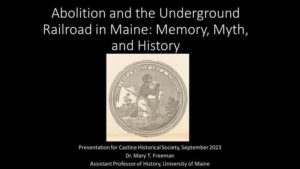 “Abolition and the Underground Railroad in Maine”
“Abolition and the Underground Railroad in Maine”
A lecture by Dr. Mary Freeman, assistant professor of history at the University of Maine, exploring slavery and emancipation in Maine, antislavery activism and the role of African Americans, and Underground Railroad myths.
View this talk on the CHS YouTube channel by clicking HERE.
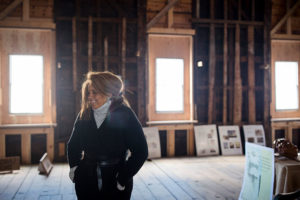 “Portland’s Abyssinian Meeting House and Its Ties to the Underground Railroad”
“Portland’s Abyssinian Meeting House and Its Ties to the Underground Railroad”
Portland’s African American meeting house, a National Historic Registry site located at 75 Newbury Street in Portland was the historical, religious, educational, and cultural center of Portland’s 19th-century African American community. It has a unique tie to Castine as one of its founders and deacons, Abraham Niles, was born, raised, and educated in Castine before moving to Portland to continue his career as a sailor.
View this talk on the CHS YouTube channel by clicking HERE.
“The Singular Life of Mary Tyler Jackson” with local historian Georgia Zildjian
A talk on two generation of Castine’s African American Jackson family by local author and historian, Georgia Zildjian.
“Hidden Legacies: Uncovering Castine’s African American History” with Lisa Simpson Lutts, Executive Director of Castine Historical Society
Lisa Simpson Lutts talks about the stories of 18th and 19th century African and African American residents of Castine. Over the past few years, CHS staff researched archival records to uncover these stories, which were ignored in the town’s written histories. Attendees will learn about the earliest enslaved people who worked in Castine and hear the stories of free black families and individuals who lived and worked in Castine.
“The Place Justice Initiative: A Statewide Truth-seeking and Historical Recovery Initiative of the Permanent Commission” with Meadow Dibble and Erika Arthur
The Permanent Commission on the Status of Racial, Indigenous, and Tribal Populations has launched a Place Justice Project that seeks to engage Wabanaki and Maine communities in examining a wide range of commemorative practices to better understand and respond to the ways in which racialized and Indigenous populations are represented in or absent from the narratives inscribed on our natural and built environment. Whose memory is visible and celebrated, and whose has been erased or misrepresented? How do the politics and practices of public remembrance and forgetting continue to impact our communities today?
Three centuries of Maine’s Black history with historian and journalist Bob Greene
Did you know that Maine’s Black history goes back to at least 12 years before the Pilgrims landed at Plymouth Rock? The history of the Pine Tree State includes many Black builders, farmers, fishermen, ship captains, educators, and more whose lives have often been forgotten or ignored. The Castine Historical Society presents historian Bob Greene, who explores and celebrates this often hidden side of Maine’s history.
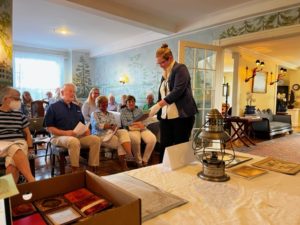 Annual Meeting 2023
Annual Meeting 2023
Following a brief CHS business meeting, Executive Director Lisa Simpson Lutts and Collections Manager Jules Thomson give a presentation highlighting new acquisitions to the CHS permanent collection. Video can be viewed HERE.
2022
The 13th Annual Deborah Pulliam Memorial Lecture with Carl Little
Guest curator for the Clark Fitz-Gerald exhibition Carl Little will deliver an illustrated lecture. In “Clark Fitz-Gerald: Castine’s Celebrated Sculptor-in-Residence” Little will highlight the life and work of the famed 20th-century sculptor, providing context for his place in modern sculpture, in Maine and beyond. The talk will feature photographs, sketches, caricatures and other materials from the Fitz-the Castine Historical Society, part of the gift of the artist’s children Leah and Stephen Fitz-Gerald.
Annual Meeting 2022
Following a brief CHS business meeting, nationally-known artist, Robert Shetterly, gives a talk on portraits he has painted and the stories of the people who affected him the most with their courage & commitment.
2021
12th Annual Deborah Pulliam Memorial Lecture: “Perfected Visions of the Past: Maritime Maine in Almost 2020 Hindsight”
Lincoln Paine, noted maritime historian, author, editor, and curator was the speaker for the 12th Annual Deborah Pulliam Memorial Lecture on July 15.
Cotton’s Ocean: Castine and the Antebellum Cotton Trade
Dr. Stephen J. Hornsby gives a talk on “Cotton’s Ocean: Castine and the Antebellum Cotton Trade.” The lecture focuses on the importance of the trans-Atlantic cotton trade for the growth of the shipbuilding and ship owning industries in Maine before the Civil War, and how Castine fit into this world of oceanic commerce.
Annual Meeting 2021
Maine Maritime Academy instructor Captain Richard F. Miller gives a talk entitled “The Square Rigged Ship: Form & Function – Then and Now.” Captain Miller is an Associate Professor and Department Chair of Marine Transportation at Maine Maritime Academy in Castine. His classes of instruction include Terrestrial Navigation (Coastal Piloting), Celestial Navigation, Seamanship, Electronic Navigation, Meteorology, and Marine Weather Routing.
2020
Voting Down the Rose: Maine’s Fight for Woman Suffrage
Anne Gass gives a talk entitled “Voting Down the Rose: Maine’s Fight for Woman Suffrage,” based on Anne Gass’s great-grandmother, Florence Brooks Whitehouse. Florence was a novelist, painter, vocalist, and mother of three sons when she first joined the suffrage movement in 1914.
2019
Deborah Pulliam Memorial Lecture 2019
Richard Ames, Guest Curator for our 2019 exhibit “Risky Business: Square-Rigged Ships and Salted Fish” gives an illustrated talk on his research on Castine’s square-rigged ships and maritime trade in the 19th century.
Annual Meeting 2019
Christopher Timm, Curator of Exhibits for the Maine Maritime Museum, gives an illustrated talk called “Maine and the Caribbean: A Plantation? A Paradise?” Mr. Timm discusses how Mainers have long traded with, fought over, and traveled to the Caribbean. He looks at how has our view of the region changed over time, and looks at the role of Maine’s ships and mariners.
2018
Deborah Pulliam Memorial Lecture 2018
Tomlin Coggeshall, grandson of Frances Perkins and founder of the Frances Perkins Center, delivers a lecture entitled “Molly Dewson and Frances Perkins: Two Powerful Women.”
Annual Meeting 2018
Castine summer resident and writer Lee Smith gives a talk entitled “BELIEVE IT OR NOT! Fact….or Fiction?” The author of 17 works of fiction, Lee has received many awards including the North Carolina Award for Literature and an Academy Award in Fiction from the American Academy of Arts and Letters.
2017
Susan Ware
Women’s historian and Molly Dewson biographer Susan Ware gives a talk entitled “Two Lifelong Partnerships: Molly Dewson and Polly Porter, and the Historian Who Wrote About Them.”
Stephen Fitz-Gerald
The Castine artist Clark Fitz-Gerald (1917-2004) created many works in his long and successful career. In this talk entitled “Treasures from Clark Fitz-Gerald’s Sketchbooks”, the audience views a digital sampling of these visual treasures with commentary by his son, Stephen, who is also an artist.
2016
Annual Meeting 2016
Peter Davis, Castine resident and award winning author and filmmaker, is the speaker at the 50th Annual Meeting and makes observations about the Society’s first half century. His talk is entitled, “Happy 50th Birthday, Castine Historical Society: Some Truths, Lies and Consequences of Your First Half Century.” Mr. Davis’ bio can be found HERE.
2015
Frederick Church’s Paintings of Maine
Noted art historian and author John Wilmerding joins the Castine Historical Society for a special event celebrating the opening of the Samuel L. Grindle House. A bio for Mr. Wilmerding can be found HERE.
Annual Meeting 2015
Building and Grounds Committee Chair Marcia Mason, Contractor Steve Shea, and former Curator Paige Lilly speak about the construction of the renovated Grindle House.
2014
Annual Meeting 2014
Gail Winkler, distinguished preservationist and design historian, discusses the thinking that went into the interior design decisions for the restoration of the Historical Society’s acquisition of the Grindle House. Dr. Winkler’s bio can be found HERE.
